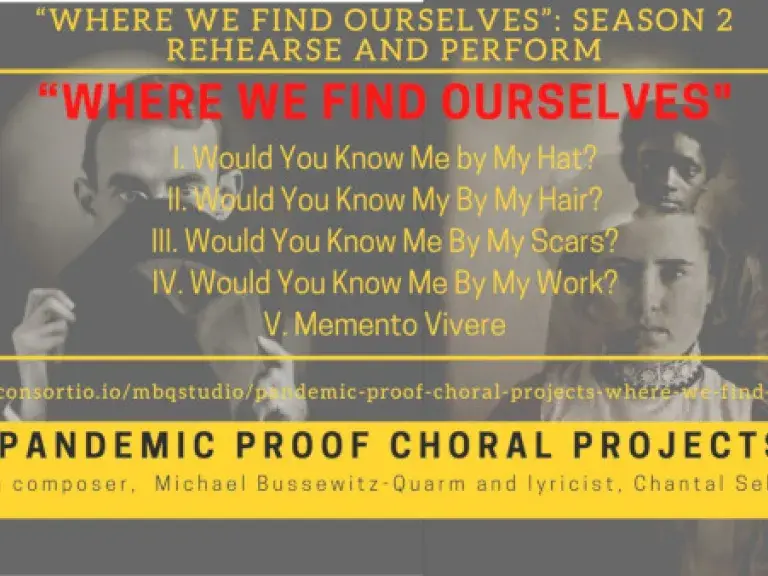
Reena Esmail is composing a series of short pieces entitled the Quarantine Madrigals. Conceived as an alternative to virtual choirs, each madrigal is designed to be a challenging puzzle for an individual singer that can be recorded with minimal technology. The seven-movement work begins with four parts in the first movement, removes a part in each movement until a single voice remains in the middle, and then adds a voice one by one until there are four parts again in the final movement. The madrigals set haiku written by LA Master Chorale singer Amy Fogerson, describing our break from society and sinking into isolation, and our gradual return.
Michael Bussewitz-Quarm has dubbed her newly launched endeavors Pandemic Proof Choral Projects. The first project Bussewitz-Quarm announced is a commission consortium opportunity that blends online and live aspects for a new five-movement work entitled Where We Find Ourselves, inspired by a collection of portraits from the American South at the turn of the 20th century by photographer Hugh Mangum. The project begins with a weekly series of 10 online conversations led by Bussewitz-Quarm and lyricist Chantal Sellers delving into the work and the history behind it. If rehearsal and performance are not possible by the time of the project’s next phase, there is an online option to continue.
Lisa Bielawa is producing a large-scale work entitled Broadcast from Home, featuring contributions from the public. Participants are invited to submit testimonies reflecting on their coronavirus experiences based on prompts that Bielawa provided. Using the contributions, she is crafting the musical material. As Bielawa writes, she posts melodies that she will incorporate, and singers can record and submit them to add their voices to the project. She has released new chapters each week so followers can see the work being created in progress. When gatherings are possible again, the full work will be performed in concert to memorialize the journey that has been completed.
Commissioned by Louisiana State University director of choral studies Trey Davis, Kile Smith composed a hopeful new work, offered to choruses in the hopes that it can be used for any efforts to gather support from their communities. The piece, entitled Everyone Sang, sets poetry from Siegfried Sassoon at the end of World War I. Smith has worked with MusicSpoke to make the piece available free to choruses everywhere during the coronavirus pandemic.
To help celebrate the holy month of Ramadan virtually, Hussein Janmohamed served as composer and artistic director of Virtual Iftar Nights, a month-long intercultural community arts festival produced by MABELLEarts in Toronto. As part of the festival, Janmohamed composed a melody entitled “Lighting Our Lantern Hearts” for singers of any level to submit recordings of themselves as part of a virtual choir.
Jim Papoulis brought youth from grades 6–12 together for a March 26 online workshop on songwriting. Young participants were invited to discuss what they're going through, aiming by the end of the workshop to write a song that speaks to this moment.
Eric Whitacre, the composer who introduced the world to the virtual choir a decade ago, wrote a piece specifically for a new virtual choir to bring singers together during the coronavirus pandemic. Virtual Choir 6, featuring the new piece “Sing Gently,” debuted on July 19 with over 17,000 participants from almost 130 countries.

